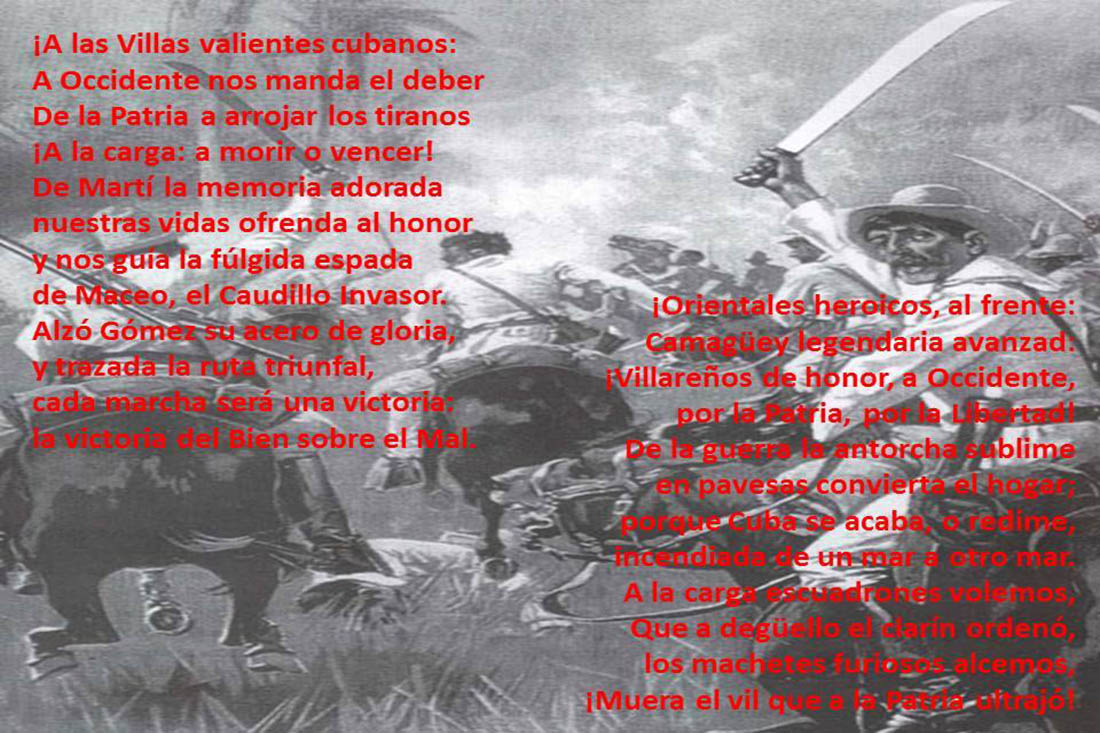On November 15th, 1895, the lyrics of the Invading Hymn would be sung for the first time. Written by Enrique Loynaz del Castillo, a member of Antonio Maceo’s troops during the Invasion of the West. Its birth took place in the fields of Najasa, specifically in La Matilde farm, owned by José Ramón Simoni, father of Amalia Simoni. Maceo evicted a Spanish column that was occupying the farm and temporarily set up a camp with a command post.
Writing
On a tour of the large house Enrique Loynaz del Castillo, a member of Maceo’s troops only 24 years old, found expletives against the mambises written on a window pane, the work of the Hispanics who had stayed there before and the signature was a painted Spanish flag. Loynaz del Castillo turned the outrage that those lyrics provoked into inspiration. That is how on the other page of that same window he responded with verses to his insults, he referred to the invasion that they had been carrying out and concluded by painting a beautiful Cuban Flag.
Loynaz del Castillo was born in Puerto Plata, Dominican Republic, on July 5th, 1871, to exiled Cuban parents. He had the happiness of knowing and being esteemed by the three great men of those feats: José Martí, who loved him like a son; Antonio Maceo, whose life he saved and was his personal assistant, and Generalissimo Máximo Gómez. He died in Havana in 1963 with the hierarchy of Major General of the Liberation Army, being the last of the Mambi generals to die.
Knowing that he had composed something beautiful, Loynaz presented his verses to the Lieutenant General and proposed that the march be named after the illustrious Mambí chief: Hymn to Maceo. He classified this action as an artistic and patriotic response. He ordered that his name be removed from his title and be named the Invading Hymn. In addition, he gave the task to Captain Manuel Dositeo Aguilera, director of the Column Music Band, to carry out the musical arrangements and incorporate it into the repertoire of the Band to play it in the combats and victories.
Its repercussion
At dawn on November 15th, the hymn already finished, was played after the Diana Mambisa. It was also sung when the troops reached the trail from Júcar to Morrón, where Máximo Gómez was waiting for them to advance together to the territory of Las Villas. For the Generalissimo it was also a pleasant surprise to see Maceo’s troops enter, led by the Band, singing the Invading Anthem.
The musical work had repercussions beyond the confines of Cuba and there is documentary evidence that it appeared in the middle of the war in the newspaper El Pabellón Cubano, published in San José, the Costa Rican capital.
Nobody doubts the value of art based on a political idea and as a reaffirmation of an ideology. So it is with the patriotic hymns that impel and compel us to fight with boldness. Today, the Invading Anthem continues to order us to combat, although it is not as well-known as it should be. A debt that we owe to our historical heritage legacy that would be well worth paying off, because, in the 126 years that have passed, it continues to be a vibrant manifestation of Cubanness and an example of the indomitable spirit that characterizes and distinguishes our people.
INVADING ANTHEM
Lyrics: Enrique Loynaz del Castillo
¡A las Villas valientes cubanos!:
A Occidente nos manda el deber.
De la Patria a arrojar los tiranos.
¡A la carga: a morir o vencer!
De Martí la memoria adorada
nuestras vidas ofrenda al honor
y nos guía la fúlgida espada
de Maceo, el Caudillo Invasor.
Alzó Gómez su acero de gloria,
y trazada la ruta triunfal,
cada marcha será una victoria:
la victoria del Bien sobre el Mal.
¡Orientales heroicos, al frente:
Camagüey legendaria avanzad:
¡Villareños de honor, a Occidente,
por la Patria, por la Libertad!
De la guerra la antorcha sublime
en pavesas convierta el hogar;
porque Cuba se acaba, o redime,
incendiada de un mar a otro mar.
A la carga escuadrones volemos,
que a degüello el clarín ordenó,
los machetes furiosos alcemos.
¡Muera el vil que a la Patria ultrajó!
Translated by: Aileen Álvarez García






